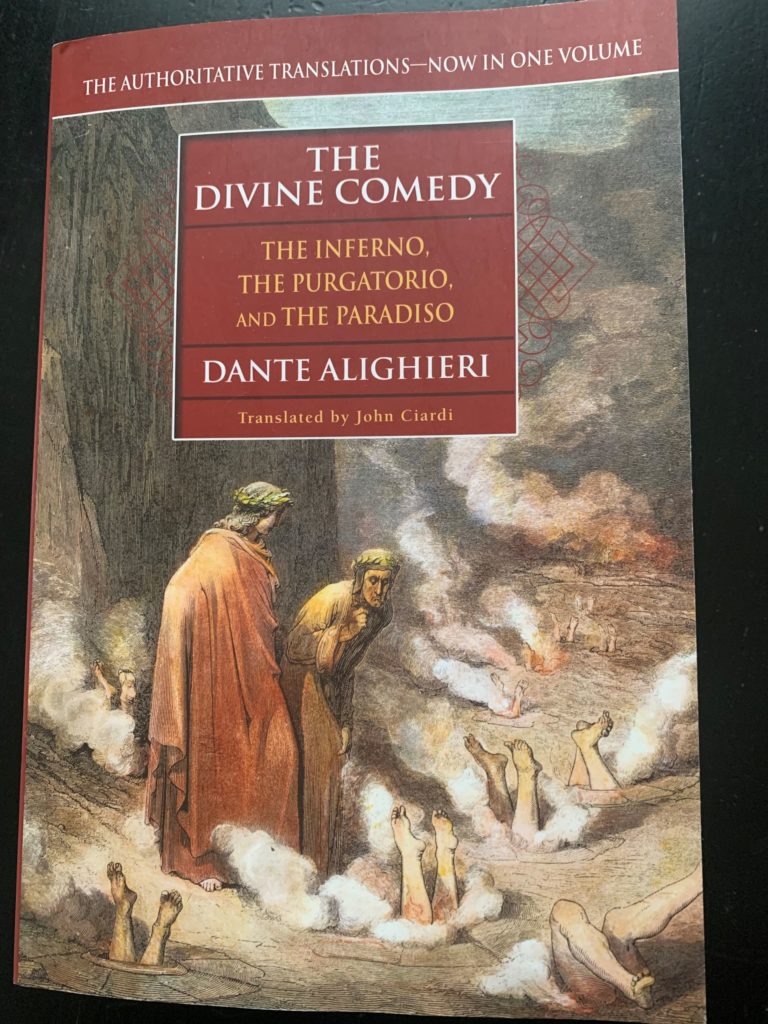Let’s take a moment to breath. It hasn’t been too many pages but the ones that are there are rough ones. There is a lot of innuendo and recent history to Dante as well as mythology and biblical references that we had to wade through. It was many a night that it took me two hours to get through 30 pages.

I should go back to the very beginning. I first read this book in AP English, in high school. My version was a straight translation and I really had no idea what was going on. It wasn’t until the classroom discussion that I had any clue that there was more to the book than the story. We didn’t have the internet so any sort of analysis had to come from sources like Cliff Notes that you had to find and buy if you were so inclined.
I really didn’t appreciate what we read in that class. From the titles that I remember, it was Canterbury Tales, Gulliver’s Travels and Moby Dick to name a few. None of them I cared for. Thirty years post, I thought that maybe I could give Dante another shot. From what I remember of his work, I thought that I could find some common ground between what I do and what he did.
I am here to say that my memory failed me. What I thought I knew was wrong. I was thinking that Dante took more of a biblical approach rather than a mythological and personal one. Were I to do it all over again, I would probably have skipped this one and left it in the memory hole because I am more than sure that I don’t agree with Dante’s view of the afterworld.
We are going to go on to Purgatory because I said so. That being said, I am not holding out any hope that this will work out any more favorably than it has so far. I won’t say that I hated the book, I didn’t. It is disappointing that it is not what I thought I was doing. That is hard to come back from.
The monsters, creatures and tortures were fun. I give Dante credit for what he did and then adding a personal vendetta to the whole thing. I have come to understand that Dante had some monastic training and this played strongly into the whole story. But to the accuracy and the theological logic was pretty shaky in my opinion.
In general, I think society’s mores have changed a lot since the 1300s. I suspect that disconnect makes me not empathize nearly as strongly with the crimes and punishments. According to common law (English middle ages in origin), we rank crimes against people over crimes against property. Then we still also have some Puritan in us so we have crimes against ourselves or so called victimless crimes. If I read things right, Dante puts hypocrisy (regardless of the victim) over murder and graft; something that we don’t give a second thought about.
It does remain to be seen that sin and crime are not synonymous. In a world created by god, in his image for us to spend eternity with him, it is hard to appreciate heresy being smaller sin than hypocrisy. Adam was created to be a friend of God, how is it possible that God’s betrayal be worse than man’s? I mean that the whole hierarchy made little to no sense to me other than gross categories.
Moving forward, as a protestant I don’t jive with Purgatory. It is not something that I believe nor have I invested much energy into learning about it. From what I have ascertained so far, Purgatory is a place to atone for sins before you can ascend to Heaven. It also appears that some of the same sins in Hell are also found in Purgatory. Next week it will be the first nine Cantos in Purgatory.
End Your Programming Routine: I don’t mean to be down on Dante, we just don’t believe the same things. We also come from different times and cultures. If you haven’t read the Inferno, it is a must read to round you out as a person, not to give you insight into the afterlife. This is fiction and entertainment just like “The Good Place“. Just keep that in perspective.
Recent Comments